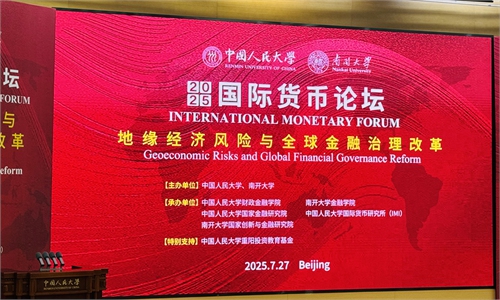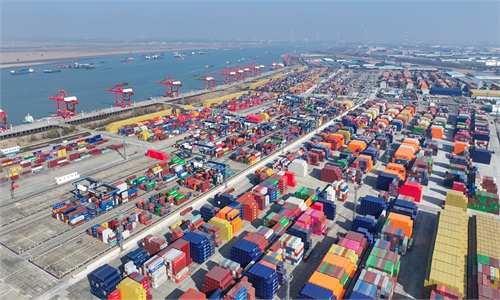
RMB internationalization is a systematic solution for China to effectively address the deepening impact of geo-economic risks in the world, which also contributes to stabilizing global markets as well as the international financial system.
Some countries refuse to relinquish their long-held dominant positions and monopolistic power in global supply chains, the global monetary and financial systems, as well as global governance. Technology blockades, financial sanctions, and the abusive use of legislative and regulatory "long-arm jurisdictions" are specific manifestations of those countries leveraging their power to artificially create geo-economic risks.
As the Chinese currency, the RMB or the yuan, increasingly matures into a major international currency, it can bring a diversified mechanism into the international monetary and financial system, helping mitigate the systemic risks arising from the inherent instability of a world economic order based on self-interest and a monopolistic core. In this sense, RMB internationalization benefits not only China but also the whole world.
The Belt and Road Initiative (BRI) and the Regional Comprehensive Economic Partnership (RCEP) framework are both China's practices of new regional economic integration, adhering to the principles of consultation, joint construction and sharing. They prioritize development, sovereign equality, and respect for differences in varied countries' development stages, focusing on infrastructure construction and integration of institutional rules to collectively promote inclusive development and re-globalization. Both the BRI and the RCEP framework hold significant importance for RMB internationalization.
The more critical an economy's position in the global supply chain, the more effective it is in enhancing the welfare of supply chain partners and strengthening supply chain resilience through providing better financial services. Also, as a country's financial system improves its ability to support the sustainable growth of the global supply chain, the foundation for the international use of its currency is inevitably solidified.
Therefore, in international economic and trade cooperation primarily involving developing countries, China should fully leverage its role as a regional powerhouse in integrating industrial and supply chains, continuously optimizing the hardware and software conditions for the member countries to use and hold the Chinese currency.
By promoting regional economic and financial integration, China should advance the economic and financial development of the member countries, continuously improve resource integration efficiency, share the developmental dividends of multilateral cooperation, and build a community with a shared future in the field of economic and trade cooperation.
The BRI and the RCEP have the potential to become crucial platforms for promoting RMB internationalization, but they also face numerous obstacles and challenges. Currently, the level of RMB usage in those regions remains relatively low, and its competitive advantage over other major international currencies is not yet prominent.
On one hand, the convenience and flexibility for non-Chinese residents to acquire, use, and hold RMB for trade, investment, risk management, or asset allocation are far from ideal. On the other hand, the breadth, depth, and openness of China's financial markets, as well as the efficiency of macroeconomic risk management, remain insufficient to support broader international use of the currency. These constraints are expected to be gradually addressed through high-quality financial development and greater financial opening-up.
China is a staunch supporter of new economic globalization, as we believe that fostering a cooperative, win-win and open global economy aligns with the common interests of the humanity and represents the right direction for historical progress.
As a key regional player, China should shoulder greater responsibilities and play a more significant role. Emphasis should be placed on enhancing the "hard connectivity" of financial infrastructure and the "soft connectivity" of institutional rules to create better conditions for the widespread use of the RMB in the region.
China should actively promote RMB's role as a global public good in areas such as trade pricing and settlement, financial transactions, and reserve assets, while promptly addressing the practical demands of regional member countries for secure and reliable international liquidity assets.
Notably, amidst the growing impact of deepening geo-economic risks in the world, the global payment system and official reserve currencies of various countries are showing a trend toward diversification.
Our research finds that as the geo-economic risk index (GER) rises, RMB Internationalization index (RII) also increases. In the context of the evolving global payment system and reserve currency landscape under the geo-economic shocks, efforts should be made to strengthen the Cross-border Interbank Payment System (CIPS), seize the development opportunities of central bank digital currencies (CBDC), and create new prospects for RMB internationalization.
The author is deputy director of International Monetary Institute of Renmin University of China. bizopinion@globaltimes.com.cn








